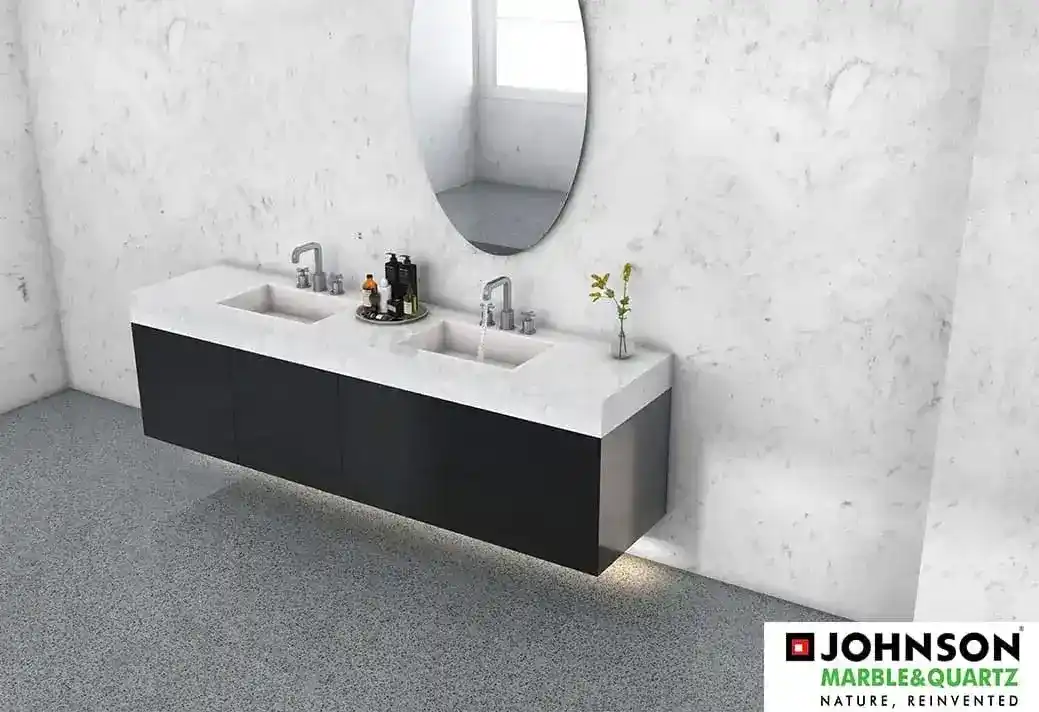The proper materials must be selected when creating and renovating spaces. A new competitor
to marble, also known as engineered stone, has developed due to technological breakthroughs.
Marble has long been seen as a sign of richness and beauty. This guide will explain why
artificial
marble
is preferable to natural marble by showcasing its features and advantages.
So let's explore the world of manufactured stone together!
What is Artificial Marble?
Understanding Engineered Stone:
Natural marble chips are combined with a mixture of resins and colors to create
artificial
marble
, also known as engineered stone. These parts are compressed and heated to create
slabs or tiles that resemble natural marble in appearance and texture. The result is a
magnificent product that blends marble's natural beauty with increased durability and
versatility.
The key points of distinction between Artificial Marble and natural marble:
Now that we have a fair understanding of what artificial marble is, let’s understand the key
differences between it and natural marble:
-
Durability and Resistance:
The excellent durability of artificial marble is one of its main benefits.
Engineered
stone
is designed to be extremely resistant to impact, scratches, and stains, unlike
natural marble, which is vulnerable to cracks and chipping. This makes it the perfect option for high-traffic areas where durability is crucial, like kitchen countertops,
bathroom vanities, and flooring.
-
Enhanced Resistance to Stains:
The non-porous surface of artificial marble offers excellent resistance to stains and
spills. Engineered stone is resistant to liquids like coffee, wine, and oils, unlike natural
marble, which can absorb liquids and leave behind lasting traces. This feature maintains
the material's durability and makes it simpler to clean and maintain, thus saving you
time and effort.
-
Heat and Chemical Resistance:
Engineered stone is ideal for various applications because of its exceptional resistance
to heat and chemicals. Artificial marble will endure the demands of daily use without
losing its beauty or structural integrity, even if you place hot pots and pans directly on
your kitchen countertop or use powerful cleaning products.
Aesthetics and Marble Design Freedom:
Let’s check the key differences in aesthetics and design point of view:
-
Consistent Appearance:
Artificial marble has the potential to provide a constant appearance across the entire
surface, which is one of its benefits. Natural marble frequently displays differences in
color, veining, and patterns, making it difficult to obtain a consistent appearance. Unlike
natural marble, engineered stone offers a consistent and regulated look that lets you
select the precise design and color for your project
-
Wide Range of Colors and Patterns:
The limitations of natural marble are exceeded by the wide variety of hues and patterns
offered by artificial marble. Modern shapes, brilliant shades, and tones not seen in
nature can all be found in engineered stone. Engineered stone allows you to fit your
design preferences, whether you desire a timeless, traditional style or a strong,
contemporary statement.
-
Customization Options:
Artificial marble offers more design flexibility than natural marble, which restricts
customization. It is easily formable and fabricatable, allowing for the creation of curved
surfaces and delicate embellishments to match any area. Whether you're picturing a
custom sculpture or a countertop edge profile, engineered stone can easily and
precisely realize your ideas.
Ease of Installation and Maintenance of marble:
Now, we will check the critical differences between natural and artificial marble as far as
installation and maintenance are concerned:
-
Simple Installation Process:
Artificial marble has a simple installation procedure that saves time and money on
labor. Because the slabs or tiles are produced in conventional sizes and thicknesses,
handling and installing them is simple. Additionally, the uniformity of size and shape
guarantees a smooth fit, giving the appearance a polished and businesslike feel.
-
Low Maintenance Requirements:
Compared to natural marble, fake marble requires less maintenance. Due to its non-
porous surface, sealing is unnecessary because liquids cannot be absorbed. Routine
washing with light soap and water is typically adequate to maintain its flawless
appearance. You may enjoy the beauty of marble with engineered stone without having
to perform the considerable upkeep necessary for natural marble.
Marble Cost-Effectiveness:
Cost is an important factor to consider when choosing natural or artificial marble. Let’s see how
both these marbles fare in the price aspect.
-
Affordable Alternative:
You can considerably lower the overall cost of your project by selecting artificial marble. instead of natural marble. Engineered stone offers a cheaper option without
sacrificing aesthetic appeal or quality, whereas natural marble is noted for its exclusivity
and higher price point. You may have the opulent appearance you want with imitation
marble while staying on a tight budget.
-
Long-Term Savings:
Artificial marble offers long-term savings in addition to initial cost savings because of its
durability and low maintenance needs. Due to its durability to stains, scratches, and
heat, it requires fewer repairs and replacements over time, which lowers costs. You are
making a sensible financial choice by spending money on the engineered stone that will
pay off in the future.
Environmental Considerations:
Finally, environmental factors are another important aspect to consider when choosing the
ideal marble. Let’s find out which marble stands out here.
-
Sustainable Solution:
A sustainable option for those who care about the environment is
artificial
marble
. Engineered stone production produces as little waste as possible and uses
recycled resources, lowering its environmental impact. Additionally, since no quarries
are needed to extract additional stone, choosing engineered stone over natural marble
helps preserve natural resources.
-
Reduced Carbon Footprint:
Artificial marble uses less energy during production and transportation than natural
marble. By using engineered stone, you actively lower your carbon footprint and help
create a more sustainable and greener future. Making eco-friendly decisions for your
design projects can benefit the environment and encourage a more ethical industry.
Conclusion
As we conclude this guide, it is clear that manufactured stone, often known as artificial marble,
excels above natural marble in several ways. Artificial marble is an excellent option for
individuals who want the beauty of marble with increased functionality because of its
remarkable durability, resistance to stains and heat, customizable designs, ease of installation
and maintenance, affordability, and environmental advantages. Consider the benefits
of engineered stone while upgrading your house or working on a business project to open up a
world of opportunities.


